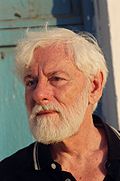ON A flight to London in 1961, I had a unique experience.
On the way, the plane made a stop in Athens and a group of Arabs joined us. That by itself was an experience. In those days, Israelis hardly ever met people from Arab countries.
Three young Arabs took seats in the row behind me, and I somehow managed to introduce myself and start a conversation with them. I learned that they were Syrians. I mentioned the recent breakup of the United Arab Republic, the union of Egypt and Syria under the pan-Arab leadership of Gamal Abd-al-Nasser.
My three neighbors were very happy about the split. One of them drew a passport from his bag and passed it to me. It was a shiny new document, issued by Syrian Arab Republic.
There could be no mistake about the immense pride with which this young Syrian showed me -- an Israeli enemy -- this evidence of Syria's new-found independence. Here was a Syrian patriot, pure and simple.
ONE OF the books which had a profound impact on me in my youth was Phillip Hitti's "A History of Syria."
Hitti, a Maronite Christian from what is now Lebanon, was educated in Ottoman Beirut and emigrated to the US, where he became the father of modern Arab studies.
His ground-breaking book was based on Syria being one country from the Sinai desert to the Turkish mountains, from the Mediterranean Sea to the borders of Iraq. This country, called Sham in Arabic, includes the present-day states of Lebanon, Israel, Palestine and Jordan.
Hitti recounted the history of this country from the earliest prehistoric times to the (then) present, layer upon layer, including every period and every region, such as Biblical Israel and the Petra of the Nabataeans. Everything was part of the superbly rich history of Sham.
The book changed my own geographical and cultural view of our place in the world. Even before the State of Israel was created, I argued that our schools should apply this inclusive view to the history of Palestine throughout the ages.
(This would have enraged Hitti, who denied that there was a country called Palestine. In a long public controversy with Albert Einstein, a devoted Zionist, Hitti claimed that the entity called Palestine was invented by the British in order to fix in the minds of people that Jews had a claim on it.)
FROM HITTI I learned for the first time about the many ethnic-religious groups of today's Syria and Lebanon. Muslim Sunnis and Shiites, Druze, Maronites, Melkites and many other ancient and modern Christian confessions in Lebanon; Sunnis, Alawites, Druze, Kurds, Assyrians and a dozen Christian confessions in Syria.
The European imperialist powers, Britain and France, which broke up the all-inclusive Ottoman Empire after World War I, had scant respect for the diversity of their new acquisitions. However, they both adopted the principle of "divide et impera." The French excelled in it.
Faced with a fierce nationalist opposition and an armed uprising led by the Druze, they carved up the rump Syria into small religious-ethnic-geographical statelets. They played on the animosities between Damacus and Aleppo, Muslims and Christians, Sunnis and Alawis, Kurds and Arabs, Druze and Sunnis.
Their most far-reaching venture, the division between a Christian-dominated "Greater Lebanon" and the rest of Syria, had a lasting effect. (It was called Greater Lebanon because the French included in it not only purely Christian regions, but also Muslim ones -- Shiite in the South and Sunni in the port cities.)
WHEN THE French were finally kicked out of the region at the end of World War II, the question was whether and how Syria and Lebanon could survive as national states.
In both there was an inbuilt contradiction between the unifying nationalism and the dividing ethnic/religious tendency. They adopted two different solutions.
(Note: You can view every article as one long page if you sign up as an Advocate Member, or higher).






